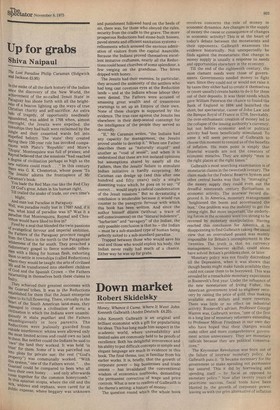Up for grabs
Shiva Naipaul
The Lost Paradise Philip Caraman (Sidgwick and Jackson £5.95)
in the midst of all the dark history of the Indian since the discovery of the New World, the achievement of the so-called 'Jesuit State' in Paraguay has shone forth with all the brightness of a beacon lighting up the ways of true Christian charity and self-sacrifice. An extra halo of tragedy, of opportunity needlessly squandered, was added in 1768 when, almost overnight, the Jesuits were expelled: the townships they had built were reclaimed by the itnigle and their cossetted wards fell into stupefied helotry. The 'state' they created during their 150-year rule has invoked comparisons with Plato's 'Republic' and More's 'Utopia'. Montesquieu was full of praises; and kaynal believed that the missions "had reached a degree of civilisation perhaps as high as the new nations could reach . . ." In this century there was G. K. Chesterton, whose poem 'To The Jesuits' adorns the frontispiece of Mr Caraman's book:
You bade the Red Man rise like the Red Clay Of God's great Adam in his human right, Till trailed the snake of trade, our own time's blight, And man lost Paradise in Paraguay.
Well, was paradise really lost in 1768? And, if it was, what kind of paradise was it? Was it a Paradise that Montesquieu, Raynal and Chesterton would have liked to live in? Fired by a zeal that blended the twin passions of evangelical fervour and imperial ambition, the Fathers of the Paraguay province ranged from the Chaco in the north to the Patagonian Wilderness of the far south. They preached a rudimentary gospel to fierce nomadic tribesThen with a liking for human flesh, exhorting them to settle in townships (called Reductions) Where they would be taught the arts of civilised life and be transformed into obedient children of God and the Spanish Crown — the Fathers incarnating in themselves both these claims to fealty.
They achieved their greatest successes with the Guarani tribes. It was in the Reductions established for them that the Jesuit enterprise came to its full flowering. There, virtually in the heart of the South American land-mass, they managed to create a civilisation of sorts; a civilisation in which the Indians were unambiguously in statu pupi/lari and the Fathers unambiguously in loco parentis. The Reductions were jealously guarded from outside interference: whites were allowed only the most limited access and could own no land 'flthem But neither could the Indians be said to tnyn' the land they worked. It was held 'in trust' for them. Some of it was parcelled out into plots for private use; the rest ("God's Property") was communally worked. "With this system," one of the Fathers wrote, ". . the _Guarani could be compared to bees who all nave their own honey. . . and only afterwards come together for the common honeycomb." in this apiarian utopia, where the old and the sick, widows and orphans, were cared for at Public expense, where beggary was unknown
and punishment followed hard on the heels of sin, there was, for those who obeyed the rules, security from the cradle to the grave. The more prosperous Reductions had stone-built houses, paved streets and efficient sanitation systems — refinements which aroused the envious admiration of visitors from the capital Asuncion. Because the Indians proved themselves excellent imitative craftsmen, nearly all the Reductions could boast churches of some splendour, a few verging on the grandiose. The hives dripped with honey.
The Jesuits had their enemies. In particular, they aroused the animosity of the settlers who had long cast covetous eyes at the Reduction lands — and at the Indians whose labour they were denied. The Fathers were accused of amassing great wealth and of treasonous yearnings to set up an Empire of their own. None of these charges is supported by the evidence. The true case against the Jesuits lies 'elsewhere: in their deep-seated contempt for the intelligence of the people they served so devotedly.
"If," Mr Caramin writes, "the Indians had any capacity for management, the Jesuits proved unable to develop it." When one Father describes them as "naturally stupid" and another as "void of sense", and when it is understood that these are not isolated opinions but assumptions shared by nearly all the Fathers, then the Jesuits' failure to stimulate Indian initiative is hardly surprising. Mr • Caraman can dredge up (and this after one hundred and fifty years) only a single dissenting voice which, he goes on to say, "if correct ... would imply a radical condemnation of the Jesuit missions." But so devastating a conclusion is intolerable because it would run counter to the panegyric fervour with which this book has been written. And since the author himself dilates (without a trace of self-consciousness) on the "natural indolence", "barbarism" and "savagery" of the Indian, the only possible conclusion is that he — the Indian — must be a sub-standard type of human being pefectly suited to a sub-standard paradise.
Trapped between those who would save his • soul and those who would exploit his body, the Indian never really had much of a chance. Either way he was up for grabs.
































 Previous page
Previous page